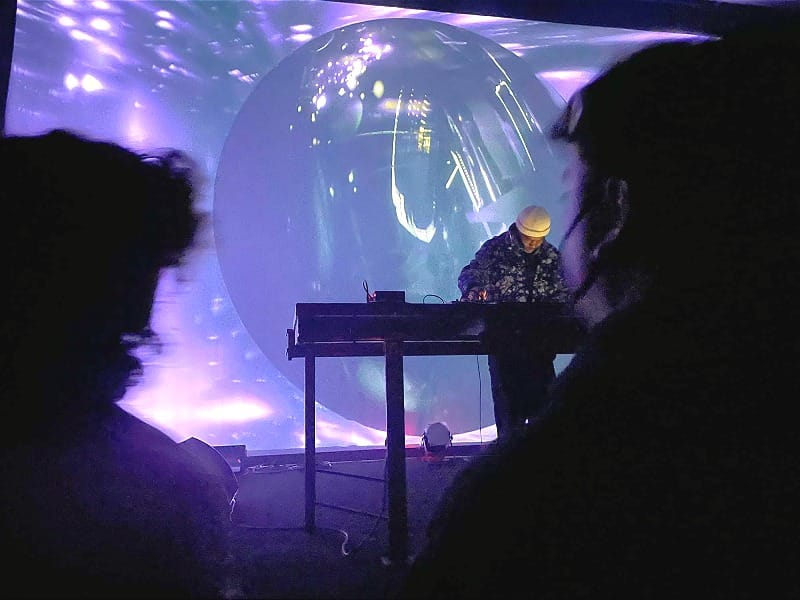Irredeemable, Non-transferrable
Actress, Chuquimamani-Condori, Mars Kumari @ Grey Area

Actress, Chuquimamani-Condori, Mars Kumari @ Grey Area
San Francisco, CA
Feb. 29, 2024
Last week more than 100 official SXSW performers, including the entire contingent of Irish artists, organized a protest exodus from the long-running Austin festival in response to the participation of U.S. military and intelligence agencies in the festival’s tech convention. Having already caught heat for pitiful to non-existent artist payouts, South By’s status as the premier showcase and networking event for the independent music industry continues to be blighted by its sponsors, first for their increasingly embarrassing promotional stunts and now their active support of a client state undertaking genocide.
In response, the official SXSW Twitter account attempted, in a widely-mocked blintz of delicate geopolitical concern filled with warm PR bullshit squirted from a pastry bag, to thread the needle between principled objection to unrest abroad and high-minded space-holding for the war machine that carries it out. Despite “unspeakable tragedies” and “the increasing spread of violent conflict” across the globe, the tweets begged, the Army and CIA should have a seat at the table because they “bring forth ideas that shape the world” and serve as a “proving ground for the systems we rely on today.”
Maybe it’s actually remarkable that the annual Bay Area music festival Noise Pop, despite more than three decades in direct proximity to so many innovation-humping data extractors sustained by bottomless Pentagon contracts, has shown little desire to expand beyond its simple, SXSW-lite concept of a few weeks of shows dotted across San Francisco and Oakland. Maybe gratitude is in order any time a long-enduring cultural institution hasn’t, or hasn’t yet, gotten so large and wayward that it finds itself in some way partnered with the defense industry or any of its rancid tertiary tech profiteers. That Noise Pop sent me and all ticket-holders a sponsored promotional email with a discount code for a ride in a driver-less Waymo–the autonomous vehicles that spontaneous mobs have been torching in the street because they’ve been colliding with pedestrians, standing inert atop injured people’s bodies, and blocking the egress of summonded emergency responders–felt dispiriting the way a four-story Doritos vending machine would, but at least I wasn’t insulted with a paean to the company’s meaningful contribution to nightlife or something. It was a reminder that for the tech industry writ large, our domestic public space is regarded as little more than a proving ground, and that for the corporations underwriting large-scale live music, we are being asked to extend grace to the meager world they are shaping.
At my most anticipated of this year’s Noise Pop shows, there was no reprieve during the headlining set of UK producer Actress, as the video screen depicted the Mercedes-Benz logo imposed in several highly-detailed, digitally-weathered biomes: bubbled in a wetland, popsicled in a tundra, enmossed in a rainforest. I had seen a live A/V set from Darren Cunningham’s project in 2019 that drew from the mood of 88, a free but password-protected mix of scratchy, demure techno experiments. Cunningham had stood behind a laptop in a fetching coat and trilby hat, manipulating static hiss and austere melodies–his overall aims, well, a little encrypted. I feared for more of the same when he hit the Grey Area stage with some icy synth sketches that gave way to throbbing, extremely loud whooshes. But then it was paired with an emphatic drum loop, an acoustic snare cracking in the dingy reverb reflections of a punk club, the first of Actress’s unpredictable recombinant moods.
Despite that and a few other strangely cloying or aggressive tones, the sounds were mostly luxurious. The set was a step abstracted from the mechanized rhythms of industrial might, not so much the stamping of rivets as the whirr of gears, the throwing of sparks, the sheen of the showroom. A threadbare 3D model of a Mercedes sport utility vehicle rotated as if in a Gran Turismo menu, various parts glitching in and out of polygonal wholeness. During the particularly lithe and sparkling "Hubble", a pair of automobile assembly line robot arms slithered in time, approximating human exuberance.
Cunningham played cuts across his catalog, including from his new album LXXXVIII, which is framed around the game of chess. More than once the video returned to an AI-generated sequence that flew over big topiary shrubs shaped like chess pieces, finally descending on a chess board that twitched with imprecision. The pieces, each an unstable amalgam, only suggested their real-life counterparts, the squares of the board liquefied black and white puddles of indeterminacy.
In one sense, the Benz and the expensively-rendered AI shittiness felt sophisticated, encircling an idea rather than a product, or running parallel with Cunningham’s use of unlikely components in uncanny forms. Overall the set actually had a compelling and seemingly intentional structure: curious moments of misdirection growing evermore vocal-driven and dance-friendly (to the excitement of the crowd) before climaxing with a dense, high-energy piece that cleverly tied up a few earlier motifs. It feels quaint to get hung up on the logo–these days it feels plausible that Ryder Ripps gave the CIA a fresh re-design. But brands, their saturated iconography, are so totemic that I can’t safely assume their use in the wild is ironic or oppositional. Like chess, their evocative power is easy to pick up, hard to master.
If there is unreserved credit due to Noise Pop, they do a laudable job boosting local acts. The cavernous synth washes of Oakland producer Mars Kumari, doused in reverb and deliriously slugged with side-chain compression, have the brooding textures and hauntological unease of many Internet-based subgenres, with hip-hop serving as its grounding force: she’s a member of Danny Brown’s Bruiser Brigade and recently opened for R.A.P. Ferreira last year at a club in Potrero Hill.
But at that gig and this one, I had trouble spotting the foundation which supports her diffuse anti-matter. When drumless, her tracks could be much more easily read as gauzy ambient; with sizzling 808 hats, the loud-pack drowsiness of witch house. A recent, more traditional boom-bap collab with Del tha Funkee Homosapien proves Kumari’s ability to do unambiguous rap production. Were these sets perhaps a gambit of unflinching ennui, a flip of the usual tranquil pleasantries of chill/study beats?
I tend to resist and then later savor this kind of illegibility. I struggled the first time hearing the rapper Fatboi Sharif, a similarly spooky dude whose style and sincerity I had a hard time calibrating. A deep baritone doomsayer, he raps like he can barely suppress a demonic cackle, his hands waving over a crystal ball. His grave and ghastly lyrics, among them some explicit political screeds, unfurl through a Spirit Halloween smirk; he often bellows and twists his bar-ending vowels with a sadistic, atonal taunt like Luther from The Warriors.
But Sharif guests on Kumari’s vaporous debut full-length, last year’s I Thought I Lost You, in a feature that showcases–and helpfully for me, clarifies–both of their strategies. Kumari conjures a barely-there fog of distant pads and half-recollected drums, upon which Sharif mourns the metaphorical death of a past self who had been riddled with doubt: “Explore pages / awkward phase / children kept quiet / altered world secretly afraid”. Sharif recounts the tolls of a victim in the voice of a villain; Kumari designs set pieces specifically for plumbing memory.
I wish this had translated at Grey Area, where Kumari cued a series of hazy voids from two 404 samplers, each movement generally following the same cycle of emergence and decay. The tracks were fixed in the loop-based vernacular of instrumental hip-hop but stretched to dance-floor lengths, missing the dynamic changes or temperature shifts necessary to justify that kind of duration. When drums appeared, they were phased and swirled across the stereo field, any distinguishing momentum thrown outside the center of the frame. The wedding of hip-hop and abstract dance music is a very fruitful pursuit: there’s recent triumphs from Huerco S and aya, even Beans from Anti-Pop Consortium is out here linking with Vladislav Delay. At their best, Kumari’s achievements on record stand alongside these, but some additional personnel on stage–a trusted trip-sitter to occupy the foreground–could put her intentions in greater focus.
Then again, one could always reject that hierarchy entirely. The experimental Bolivian-American producer Chuquimamani-Condori played tracks from their latest project, DJ E, an unmastered Bandcamp-only release that consciously avoids what the artist sees as hegemonic sonic polish. This was evident not only by the array of sounds and fidelities (one track integrates the whinny of a spinning circular saw blade) but the horizontal practice Chuquimamani-Condori brought to the performance. With two keytars in tow, backing tracks of blown-out bass and chunky caporales rhythms blaring, they played the dense pads that, for most electronic music, typically serve as subrosa sweetener or energy-elevating risers. The background was foregrounded, everything front-loaded in a fully consuming rush.
Their music is an ecstatic synthesis of Andean folk, the sensibility and sonic ephemera of North and South American working-class FM radio, and contemporary electronic extremity. Panpipes and unsheathed sword samples jostled in cacophonous revelry with acoustic strums, boisterous DJ tags and what at first blush sounds like a sample of Smashing Pumpkins’ “Tonight Tonight.”
I had seen them play earlier in the month at a downtown Oakland community arts space, a show that was part of a week-long program for a local queer Two-Spirit organization. The setting was pretty ideal: attendees munched empanadas and left sacraments on a flower-strewn altar, and the rented PA was juiced within an inch of its life. That night, stranded at 2 a.m., heavy and unrelenting winter rain filling the gutters, I called a Lyft. I only do this on occasion for many reasons, namely because of how often the exact same conversation transpires: a totally anodyne discussion of the weather with the driver turns to how pitiful their payouts from the company have become. The guy buzzing me back to Paradise Park said he’d be receiving $4 for the trip.
I would note that on Grey Area’s sound system, some destabilizing sonic elements in the downtown Oakland performance had been clarified, but not entirely tamed. There and here, during the dizzyingly dense “Return”, Chuquimamani-Condori tapped on the keytar’s neck pick-up to apply shuddering tremolo, putting the entire room’s cabin pressure in flux.
They took a rare conventional melodic lead on the joyous finale “Until I Find You Again”, tapping out plucky, cheerful intervals and then sustaining their swooning, accordion-like bellow. Alongside the tender fiddle of a country ballad, jagged kick drums landed like shrapnel whipped by a powerful seaside gale. Advanced yet pastoral, romantic yet hardly complacent, the music was utterly transporting not due to otherworldly remove but compressed proximity. There was terrific whooshing, and oh was it loud, but here I felt swept away, high as in literal altitude, like I’d rolled down the window of a pick-up truck barreling across a mountainside, the radio tuned to a broadcast from a more hopeful future.

